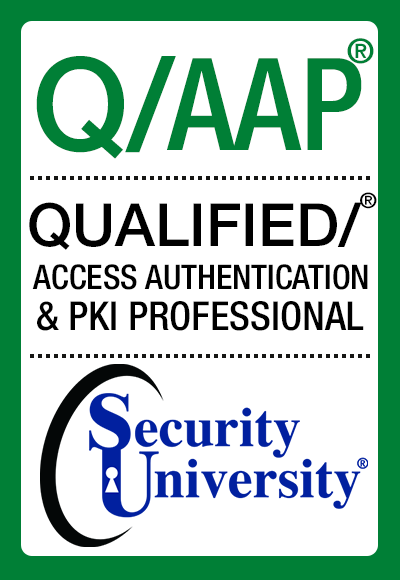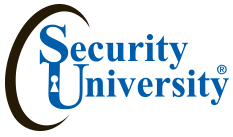 Access, Authentication, Identity and PKI methods and processes to raise the level of information security to make your network infrastructure more secure. Web and other forms of E-Commerce introduce a whole new group of information security challenges. Traditional password authentication, access controls and network perimeter security safeguards fall short. Data traveling over untrusted networks must be protected by encryption methods that are highly dependent on flexible and robust key management schemes. This 72 hour hands-on class, teaches you how to plan, evaluate, develop, and implement a successful enterprise network security framework using Public Key Infrastructure (PKI), authentication, identity, and access authorization systems. You will install multiple certification authorities, various smart cards, tokens and biometrics that will raise the level of information security in your organization. Upon completion of the course, you’ll have all the experience, confidence, and tools you need to plan Certificate Policy & Certificate Practice Statements and execute a fully integrated PKI. Note: This class is intended to be a practical product design/integration course & does not cover encryption mathematics.
Access, Authentication, Identity and PKI methods and processes to raise the level of information security to make your network infrastructure more secure. Web and other forms of E-Commerce introduce a whole new group of information security challenges. Traditional password authentication, access controls and network perimeter security safeguards fall short. Data traveling over untrusted networks must be protected by encryption methods that are highly dependent on flexible and robust key management schemes. This 72 hour hands-on class, teaches you how to plan, evaluate, develop, and implement a successful enterprise network security framework using Public Key Infrastructure (PKI), authentication, identity, and access authorization systems. You will install multiple certification authorities, various smart cards, tokens and biometrics that will raise the level of information security in your organization. Upon completion of the course, you’ll have all the experience, confidence, and tools you need to plan Certificate Policy & Certificate Practice Statements and execute a fully integrated PKI. Note: This class is intended to be a practical product design/integration course & does not cover encryption mathematics.
| Class Fee: | $3,990 |
| Time: | 72 hrs |
| Learning Level: | Entry |
| Contact Hours: | 41 hr Lecture 31 hr labs |
| Prerequisites: | Understanding of TCP/IP Protocols |
| Credits: | 72 CPE / 3 CEU |
| Method of Delivery: | Residential (100% face-to-face) or Hybrid |
| Instructor: | TBD |
| Method of Evaluation: | 95 % attendance 2. 100 % completion of Lab |
| Grading: | Pass = Attendance+ labs & quizzes Fail > 95% Attendance |
Sample Job Titles:
Computer Network Defense (CND) Analyst (Cryptologic)
Cybersecurity Intelligence Analyst
Enterprise Network Defense (END) Analyst
Focused Operations Analyst
Incident Analyst/Network Defense Technician/ Network Security Engineer
Security Analyst/ Security Operator
Sensor Analyst
Text Materials: labs, SU Pen Testing Materials, resource CD’s and attack handouts
Machines a Dual Core 16M Ram, 1TGig drives, running MS OS, linux, and VMWare Workstation
This 72 hour accelerated class is taught using face to face modality or hybrid modality. Class includes 72 hours of contact studies, labs, reading assignments and final exam - passing the final exam is a requirement for graduation.
Risk Management - Oversees, evaluates, and supports the documentation, validation, and accreditation processes necessary to ensure new and existing information technology (IT) systems meet the organization’s information assurance (IA) and security requirements. Ensures appropriate treatment of risk, compliance, and monitoring assurance from internal and external perspectives.
Learning Objectives
Install 7 different encryption keys - individual and enterprise. Share keys, secure repudiation.
Stand up with policy multiple certification authorities. HSPD-12 tools– In an effort to better secure federal resources and reduce the potential for terrorist attacks, Homeland Security Presidential Directive 12 (HSPD-12)
The goal of HSPD-12 is to require federal agencies to adopt a standard, secure, and reliable identification card (the “PIV card”) for employees and contractors – and to ensure that it's only issued only to intended individuals.
KU Outcomes:
- Students shall be able to list the fundamental concepts of the Information Assurance / Cyber Defense discipline.
- Students will be able to describe how the fundamental concepts of cyber defense can be used to provide system security.
- Students will be able to examine the architecture of a typical, complex system and identify significant vulnerabilities, risks, and points at which specific security technologies/methods should be employed.
Learning Objectives
- Defending your electronic assets from hackers
- Encryption & Identity Mgt tools
- Security design and control methods
- Return on investment strategies and methods
- How to plan & Implement a PKI
* Threats and Adversaries
* Vulnerabilities and Risks
* Basic Risk Assessment
* Security Life-Cycle
* Intrusion Detection and Prevention Systems
* Cryptography
* Data Security (in transmission, at rest, in processing)
* Security Models
* Access Control Models (MAC, DAC, RBAC)
* Confidentiality, Integrity, Availability, Access, Authentication, Authorization, Non-Repudiation,
Privacy* Security Mechanisms & I &A Audit
Who Should Attend:
Information Technology and Information Security Architects, Information Security Officers and Managers, Network and System Engineers, Consultants, Information Security Analysts, Information Technology Auditors, E-Commerce Application Developers and Integrators, and enterprise network security solutions.
Grades - All students must ordinarily take all quizzes, labs, final exam and submit the class practical in order to be eligible for a Q/ISP, Q/IAP, Q/SSE, or Q/WP credential unless granted an exception in writing by the President. Know that Q/ISP classes draws quite the spectrum of students, including "those less comfortable," "those more comfortable," and those somewhere in between. However, what ultimately matters in this course is not so much where you end up relative to your classmates but where you end up relative to the outcome on Friday of class. The course is graded as a pass or fail solely on your attendance and participation in quizzes, labs other assessed activities. Those less comfortable and somewhere in between are not at a disadvantage vis-à-vis those more comfortable. Escalating labs help you prepare for real world scenarios. Each labs escalates upon itself, increasing in intensity, rising to the next level, while your mitigating the threat step by step Books - No books are required for this course. However, you may want to supplement your preparation for or review of some lectures with self-assigned readings relevant to those lectures' content from either of the books below. The first is intended for those inexperienced in (or less comfortable with the idea of) hacking. The second is intended for those experienced in (or more comfortable with the idea of) hacking. Both are available at sites like Amazon.com. Both are avail at the SU Hacker Library. Realize that free, if not superior, resources can be found on the SU website.



